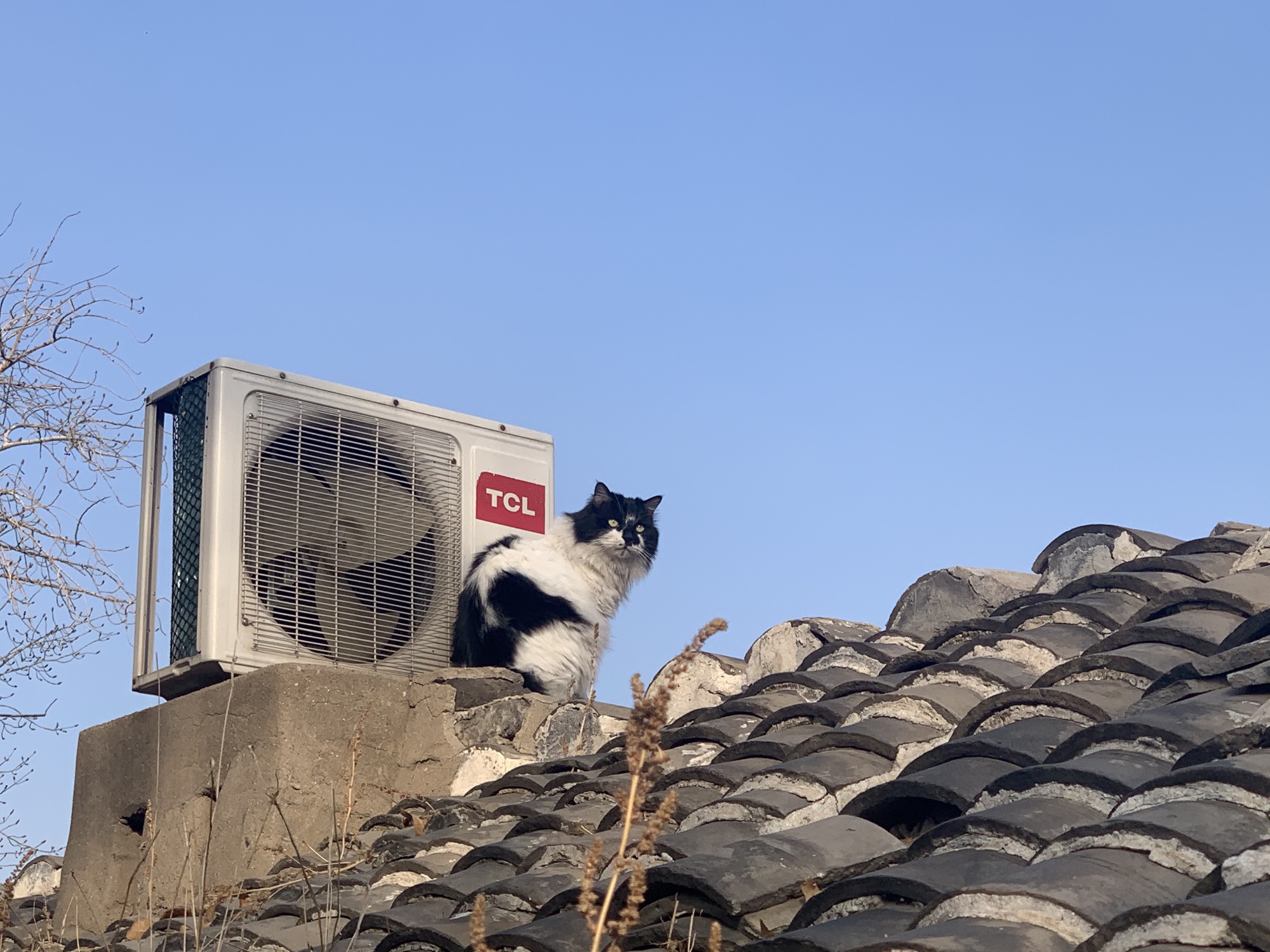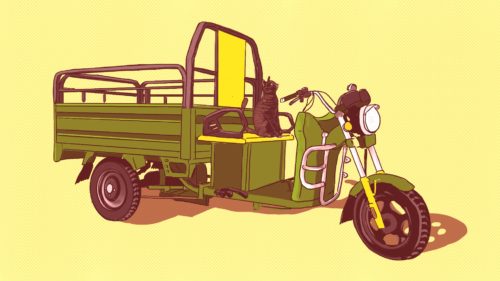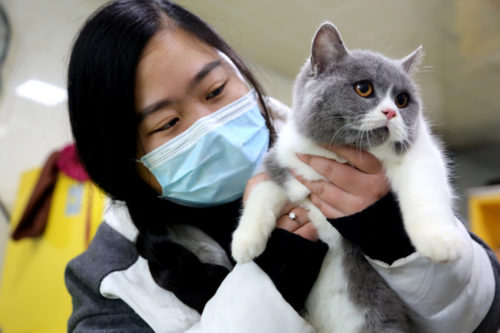Beijing Lights: Aunt Wang on cats and contentment
"Perhaps it is a reward for feeding the cats — life has been good to me."

Beijing Lights is a column written by Huang Chenkuang, published by the Beijing-based literary arts collective Spittoon, in which she tells the stories of the marginalized from their point of view. It is syndicated here with permission. This article was originally published under the headline “I’ve Never Dreamed of Wealth or Fame” (click through to read it in Chinese), and appears here with slight edits.
Note from Kuang:
I spoke with Aunt Wang last May.
After retiring a decade ago, Wang fed stray cats every day. She adopted more than 20 of them. Over the years, the expenses added up. She and her husband lived on their retirement pension, which was just enough to support their basic needs with some thrift and planning.
Today, I was told that Aunt Wang passed away. She was 66.

Wang, female, 65 years old, from Shandong, stray cat feeder
I just love cats so much. Whenever I see a cat I just can’t take my eyes off it.
My ancestral home is in Shandong. When I was 12, my father was transferred to Shaanxi. Our whole family moved to Ansai, a typical small city south of Yan’an in the Shanbei region.
We pictured Ansai as a nice place. Mao had lived in Yan’an during his revolutionary days, so how bad could it be? But when we got there we were dumbfounded — there were only dusty hills as far as the eye could see. It felt as if we’d walked over a whole mountain before we finally arrived in Ansai.
The county was like one big slum. We lived in a cave house without a toilet. If you needed to use one you had to walk a long way to the public toilets. The roads were all made of dirt. When it rained, your shoes got covered in mud. During the winter, it got so cold you would choke.
In 1973, summoned by the Central Government’s initiative to “send young people to poor areas” for reeducation, I was sent to a remote farm. I was only 16, short and super skinny, so the elders took it easy on me. I was assigned to duties involving less intensive labor — serving food and tea in the production brigade canteens, and occasionally feeding their horses.
Things got a lot harder when I was later transferred to a medicine factory. My job was to cut herbs every day. After a day of work, I was so tired that I could barely lift my arms. But I was lucky, many others were in much worse situations. There were some people who could not bear their heavy workloads, day after day, and even committed suicide.
I met my husband in Yan’an. He is originally from Beijing but was sent down to Yan’an for “receiving reeducation from the poor peasants.” My father took a liking to him. My father said he treated others well, and was the type of person you could trust for a lifetime. Arranged by my father, we got married in Yan’an.
My father was so right about him. After we got married, he not only took very good care of me, but of the whole family. During festivals and holidays, he was even more considerate than I was about bringing the best gifts for my parents.
Our daughter was born in 1979. We lived in Yan’an until 1991, when Beijing introduced new policies allowing those sent-down youth to return to the city. We followed my husband back to Beijing.
Coming back to Beijing didn’t promise an easier life. The government didn’t provide any support for the returning sent-back youth except a hukou (household registration pegged to a city). We could only rely on ourselves to try and earn a living.
My husband got a job in Tongren Hospital doing logistics. He stayed at his position until retirement. Meanwhile, I changed jobs quite a few times. First I worked in a grocery store; then, when it closed, I worked as a care worker in a hospital. Through the family of one of the patients, I was introduced to a job as a cleaner at a travel agency. The pay was good and everyone there treated me well. They saved plastic bottles and paper boxes for me, which was enough for me to make an extra 10 to 20 kuai ($1.50 to $3) a day. I worked for that company for over a decade until my legs could no longer handle the job.
After retiring, I started going out to feed the stray cats. I am as punctual as when I was working: Every day I leave the house at 3 p.m. and walk to the park nearby. If you count the cats on the way to the park, there are at least 30 to 40 of them. Whenever they hear me, they know their food is coming. They rush out from their hiding place in the grass. I have given a name to each of them. Three Flower, Sweet Fragrance, and Dahlia — I’ve been feeding them since they were baby kittens.
I’ve rescued and adopted so many cats. In my house right now I’m raising over 20 of them! I can’t afford fancy cat food, only the most basic kind that comes in big packages. A package of 10 kg lasts only five days. I mix in some canned food, the cats like it more this way. When I see them enjoying the food, it makes me happy.
My knees are not good, so when I walk I have to take a short rest every once in a while. It is usually 8 p.m. when I get home. At my age I should be enjoying rest and leisure, but here I am, spending my days feeding and caring for stray cats. But who made me love cats so much? No matter how exhausting it is, when I see them I don’t feel tired anymore.
Over the years, whenever a cat dies, I try to find a place to properly bury it. I try to hold a small ceremony, and ask Buddha to give it better fortune in the next life.
Perhaps it is a reward for feeding the cats: life has been good to me.
Both my husband and I have retirement pensions, not a big sum but enough to support us. As for my daughter, she is healthy and doing well. She is a good daughter too. We used to worry a lot about her being single, but now we don’t think it’s a problem as long as she is happy. As parents, what more do you need from your children?
If we’re on the subject of happiness again, I have to talk more about my husband.
We got married when I was 22. It’s been over 40 years and he has never stopped being affectionate. I’m not good-looking — I was born with lipoma on my face, but that doesn’t seem to bother him at all. He only sees the good in me. Even when I’m quick-tempered sometimes, he is patient and forgiving.
It’s also all thanks to his consistent support that I can take care of all these cats. He helps me buy them food and take them to the vet. He also bought me a pushcart and a small folding chair so that I can rest when I’m out. He bought me a cover for my knees to help ease the pain; even when it wasn’t the right fit and he had to go back and forth to exchange for different sizes, he didn’t think it was any trouble. In our house, he is also the one buying groceries and cooking three meals a day.
My whole life I’ve never dreamed of having wealth or fame. Because of my husband, my life feels so full and content. Finding the right partner has been the great fortune of my life. And being with him has been my life’s great meaning.
Check out the Beijing Lights archive on Spittoon.





